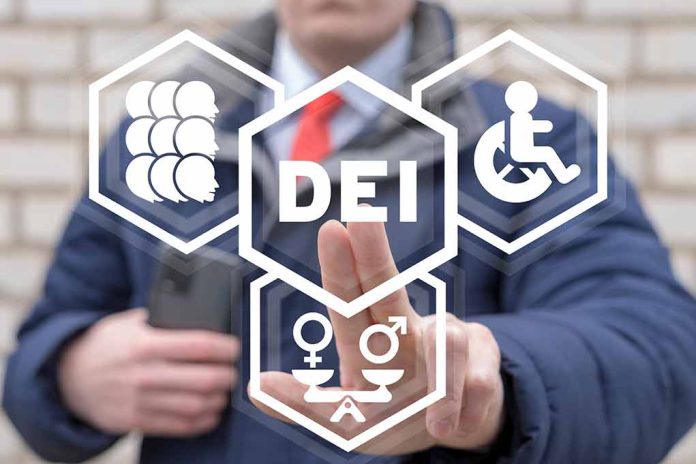
The debate over diversity, equity, and inclusion (DEI) policies, particularly under Donald Trump’s Department of Justice, highlights the tension between promoting workplace diversity and accusations of reverse discrimination.
At a Glance
- Trump’s administration considered interventions against DEI practices in employment.
- Advocates claim DEI initiatives lead to reverse discrimination against white and Asian applicants.
- Biden’s administration rolled back Trump’s order to promote racial equity.
- Legal and corporate challenges to DEI practices are growing, sparking debate on their effectiveness.
Trump’s Executive Order and the Backlash
In 2020, former President Donald Trump signed an executive order against “race and sex stereotyping and scapegoating” in workplace diversity programs, aiming to curtail what his administration perceived as discrimination against certain racial groups. The order targeted DEI initiatives, describing them as potentially supporting bias against white and Asian individuals.
The move led to significant opposition and was rescinded by President Joe Biden upon taking office in January 2021. His administration promoted “racial equity and support for underserved communities,” marking a shift toward encouraging DEI initiatives.
Corporate and Legal Pushback
Companies like Walmart have faced legal challenges and have had to roll back or adjust their DEI programs due to pressure from conservative groups and potential legal risks. Legal actions, such as investigations and consent decrees led by Trump’s DOJ, were anticipated to ensure fairness in employment practices without racial bias.
“The DOJ has a panoply of remedies it can seek to address the discrimination that results from these DEI programs,” notes David Pivtorak, a lawyer who has active cases against American Express for alleged racial discrimination against white employees.
The debate over the effectiveness of DEI programs extends beyond the federal level, affecting state policies, universities, and donors, which may change their practices to comply with evolving legal interpretations surrounding discrimination.
The Future of DEI Programs
Under the previous and future Trump administration, efforts may intensify to redefine DEI policies, arguing they undermine meritocracy in employment law. Critics claim such practices create workplace atmospheres of fear and resentment, especially in tech sectors like Silicon Valley.
“From a cost-benefit perspective, companies may decide that the hassle of maintaining DEI is just not worth it, especially since these are not profitable endeavors but are mostly there to keep a small contingent of vocal activists satisfied,” Pivtorak says.
As legal challenges continue and rhetoric intensifies, the future of DEI in workplaces remains uncertain, with ongoing debates over fairness, merit, and the role of government in shaping employment practices.














